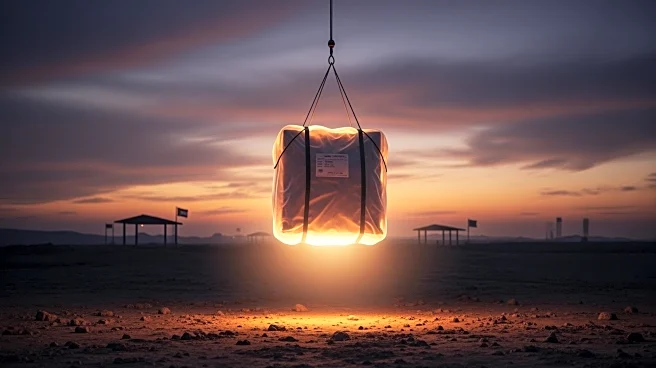What's Happening?
The United Nations humanitarian chief has called on Israel to open more crossings into Gaza to facilitate the flow of humanitarian aid. This plea comes after Israel threatened to limit supplies due to Hamas's delay in returning the bodies of deceased
hostages. The Rafah crossing between Egypt and southern Gaza remains closed, exacerbating the situation. Since the ceasefire agreement on October 10, humanitarian aid has been entering Gaza, but Israel's recent stance could restrict these efforts. Hamas has returned seven hostages' bodies, with two more expected soon, but has cited difficulties in locating all remains. The UN official emphasized the importance of adhering to the ceasefire terms and warned against using aid as a bargaining tool.
Why It's Important?
The restriction of aid to Gaza has significant humanitarian implications, potentially affecting thousands of civilians reliant on these supplies. The situation underscores the fragile nature of the ceasefire and the complex dynamics between Israel and Hamas. The UN's call for more open crossings highlights the urgency of addressing humanitarian needs and the potential for escalating tensions if aid is withheld. The broader impact includes increased food prices and shortages in Gaza, as residents fear the ceasefire may not hold. This situation could lead to further instability in the region, affecting both local populations and international diplomatic efforts.
What's Next?
The next steps involve potential diplomatic negotiations to ensure the ceasefire terms are fully implemented, including the return of hostages' bodies and the opening of crossings for aid. The UN and other international bodies may increase pressure on both Israel and Hamas to adhere to agreements. The situation could prompt further discussions on long-term solutions to the humanitarian crisis in Gaza. Stakeholders, including the U.S. and other nations involved in the peace process, may need to reassess strategies to maintain stability and support civilian needs.
Beyond the Headlines
The ongoing conflict and humanitarian crisis in Gaza raise ethical questions about the use of aid as leverage in political negotiations. The situation also highlights the challenges of balancing security concerns with humanitarian obligations. Long-term implications include potential shifts in international policy towards the Israeli-Palestinian conflict and the role of humanitarian organizations in conflict zones.

















